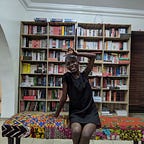Being A Femme Woman Who Loves Women
Lesbians and other WLW are expected to look, act, or talk a certain way. It’s how people see a “tomboy” and conclude that she’s into women.
For most non-heterosexual women, being femme means constantly having to prove that they actually like women, especially if they have a history of dating men.
I spoke to some femme WLW, and even though they don’t all have the same experience, there is the common issue of feeling unwelcome or like they’re under scrutiny in queer spaces.
Lola is a pansexual woman who feels invisible. She says that even though about half of her friends are queer, she feels neither accepted nor seen. “People in the community can make you feel like you’re not queer enough or that your relationships aren’t valid. It always feels like if you’re not quirky or your pronouns are binary, you’re not valid.”
She did not realise her queerness was in question until a group of queer people started excluding her from their outings and events. She feels more accepted in non-queer spaces, but the only place where she is wholly herself is with her (queer) friends.
*Rachel can definitely relate to Lola’s experience. However, unlike Lola, only a few of her friends are queer. She is 31 and realised her queerness late, so she has never felt accepted in queer spaces. People were always hostile towards her because they thought she was another straight girl pretending.
Their reception did not change even after she said she was bisexual. She has stopped going to queer spaces because of this. She prefers hanging out with her friends.
When femme WLW are assumed to be queer, it is usually because of silly things like having dreadlocks, having short hair, or having no hair at all.
*Esohe talks about how people thought she was straight until she changed her hair. She dressed pretty much the same way she did before the hair change, but people started seeing her differently after. One time, she got called a lesbian because she “dressed like a boy”.
“First, they thought I was straight. Now, they think I’m a lesbian. My hair and my clothes have nothing to do with my sexual orientation, and I’m tired of people making assumptions based on that. I’m not even a lesbian. I’m bisexual. Bisexual people exist. We’re not unicorns.”
While it seems that femme non-hetero women are invalidated, that is not always the case. *Halima, unlike most of the other people I spoke to, does not feel invisible or invalidated. She says people always seem to know she’s a lesbian, and she is hardly ever in non-queer spaces.
The only time she feels like she has to perform queerness is when she is trying to stop men from hitting on her. “Even then, it’s not a performance”, she says. “I’m just being myself.”
*Pelumi is also a lesbian, but her experience is different from Halima’s. She feels invalidated a lot. Someone once insinuated that she likes men and is only with women for fun.
She says that because she is a curvy femme lesbian, it seems like she has to shout “gay af!” for people to take her seriously.
*Ayo feels like she has to go an extra mile or water herself down to show that she belongs in queer spaces. Sometimes she decides not to wear or do something because it seems too girly.
“As a feminine presenting woman, I feel like I have to water down my femininity when I’m in queer spaces so they’d know I’m one of them. When people find out I’m bisexual, they say that’s why I’m femme like femme lesbians don’t exist.”
Esohe feels somewhat safe in queer spaces, but she still feels the need to prove that she truly belongs there and that she is not an imposter.
She is also tired of labels like femme, masc, stud, etc., because people expect you to fit into one box.
“They want you to look and act a specific way or take up a particular role because of these labels. People expect you to be either-or, but you don’t have to be. You don’t have to fit into one box. I know the word stemme exists, but is it even necessary? Why can’t you just be?”
Lola, Rachel, Esohe, and Ayo feel that not being lesbians contributes to them not being taken seriously. People hear that they are bisexual or pansexual and say they are not really queer or that they don’t count because they can pass as straight.
While they understand the need to protect queer spaces, especially in a country like Nigeria, they wish members of their community would stop invalidating and alienating them in the bid to do so.
*Names changed for anonymity.
Not so fun fact that nobody asked for: this has been in my drafts since December.
